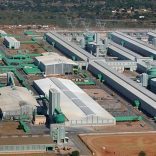Mozambique: Negotiations on Mozal power break down - AIM
Mozambique: Rebel attack on ruby mine aims to destabilise economy – analysts

Photo courtesy: Gemrock
This week’s attack by insurgents on a ruby mine in Cabo Delgado, northern Mozambique, shows that they were seeking the “economic destabilisation, publicity and media impact” resulting from their action, in part to counter the government’s “triumphalist discourse” regarding its forces’ advances against the rebels, according to analysts who spoke to Lusa.
On Wednesday, an unidentified unknown armed group attacked the premises of Gemrock, a ruby mining company in southern Cabo Delgado, destroying houses and company vehicles, and prompted to the evacuation of the premises of Montepuez Rubi Mining (MRM), a company owned by multinational Gemfields that runs the mine – 12 kilometres from the unit targeted by the insurgents.
Borges Nhamirre, a researcher at the Institute for Security Studies (ISS), an independent African research organisation, said that the armed groups want to show that they are active and remain a “major threat” to locals and economic targets, contrary to the “triumphalist discourse” of the government.
The rebels also want to demonstrate that “they are very comfortable conducting reconnaissance operations, identifying the target, seeing the government’s ability to respond and carrying out successful attacks, withdrawing without suffering any major damage”, he added, explaining that the armed groups’ operations against mining companies also show that they have not yet been decapitated, and that its leadership still has a capacity for planning and that it always seeks to retain bases, whether “permanent or transitory.
Nhamirre noted that the insurgents were forced to concentrate their operations in the south of Cabo Delgado, because they have been expelled from the northern districts.
This new dynamic of the insurgency makes clear that the aim of the presence of foreign forces from Rwanda and the Southern African Development Community (SADC) is to protect natural gas projects, creating “a belt and a perimeter” of security, he added.
For his part, Dércio Alfazema, programme director at the Institute for Multi-Party Democracy (IMD), a non-governmental organisation, said that foreign investments in Cabo Delgado are a target for the insurgents because they are at the root of the presence of foreign troops and the imbalance of military forces on the ground.
READ: Gemfields halts Mozambique operations after attack at nearby ruby mine
“For the terrorists, it seems to be an added value to attack these investments, more than to attack the population, because they gain more publicity,” he stressed.
The rebels’ actions, he continued, are also aimed at drawing the attention of national and international public opinion to their activity, countering reports that they are on the run.
“By attacking foreign investment, they create the feeling that they exist and are growing in strength,” he said.
The IMD programme director warned of reports of attempts by rebel groups to recruit young people from Mozambique’s central provinces, where they had previously mainly recruited fighters from the north.
The change of strategy, he stressed, is due to the military pressure that the insurgents are under in the north, in the area where the natural gas projects are sited, in Palma district.
João Feijó, a researcher with the NGO Observatory of the Rural Setting (OMR), said that the insurgents’ actions against economic targets are part of a strategy of “economic destabilisation” and depriving the state of the resources it needs to function normally.
“These attacks on economic assets cause, in fact, a major economic destabilisation, because these are sources of taxes for the state,” Feijó pointed out, noting that enterprises owned in whole or in part by foreign investors, which are important for the government, are always preferred targets for terrorist groups.
The OMR researcher pointed out that the operations by government forces from Mozambique, Rwanda and Southern Africa have managed to reduce the rebellion in Cabo Delgado to low-intensity and dispersed guerrilla warfare, but still with the capacity to generate panic.
“This low-intensity guerrilla warfare frightens people and harms big economic interests,” he notes.
READ: Hundreds flee attacks in Mozambique’s ruby mining region – HRW
The Centre for Democracy and Development (CDD), another NGO, says in a statement released on Friday that “violent extremism hits Montepuez and threatens the million-dollar ruby business,” noting that the incursion “by violent extremists against one of Cabo Delgado’s main sources of wealth comes two weeks after Gemrock held its first auction of raw rubies mined in Montepuez.”
At the same time, the new wave of attacks in the southern districts of Cabo Delgado is worsening the humanitarian crisis in the province, with thousands of families leaving their communities in search of refuge, states the CDD.
“Violent extremists seem to be concentrating their actions in the southern districts of the province, threatening ruby and graphite extraction projects,” it points out.
READ: Gemrock’s inaugural Mozambique ruby auction garners great response
Cabo Delgado province is rich in natural gas but has been terrorised since 2017 by armed violence, with responsibility for some attacks claimed by the local affiliate of the extremist group Islamic State.
The insurgency prompted a military response that for the past year has enjoyed support from Rwanda and the SADC, liberating districts near gas projects. But new waves of violence have emerged south of that region and in neighbouring Nampula province.
In five years, the conflict has left one million people displaced, according to the office of the United Nations High Commissioner for Refugees, and around 4,000 dead, according to the ACLED conflict registration project.
Five years later, violent extremists hit Montepuez and threatens the million-dollar ruby business
Read more:https://t.co/5leTCvrLcX pic.twitter.com/Tj766OgwJV
— CDD – Centro para Democracia e Desenvolvimento (@CDD_Moz) October 21, 2022












Leave a Reply
Be the First to Comment!
You must be logged in to post a comment.
You must be logged in to post a comment.